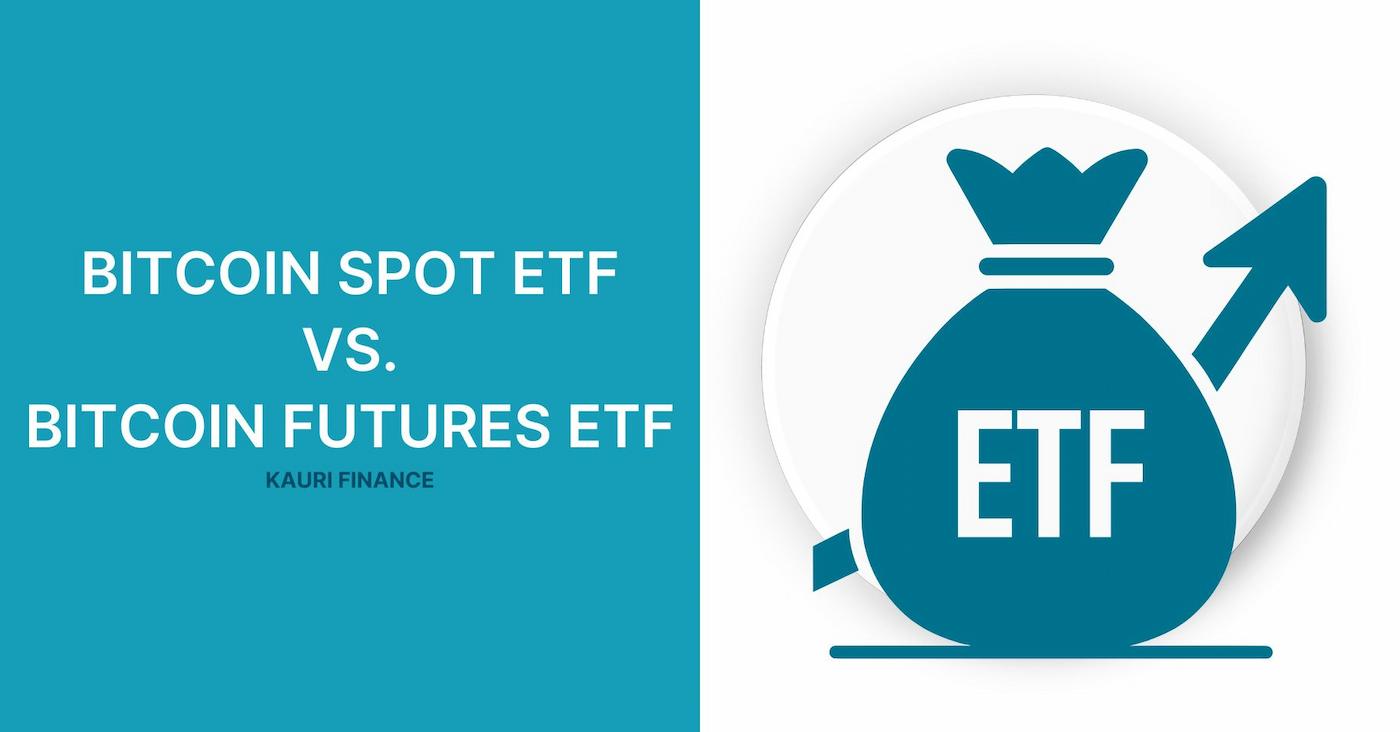
Spot vs. Futures Bitcoin ETFs: Key Differences
- What Is an ETF?
- Operation and Trading
- What are Bitcoin ETFs?
- Types of Bitcoin ETFs
- What Is a Bitcoin Spot ETF?
- What Is a Bitcoin Futures ETF?
- Example and Mechanics
- Benefits and Drawbacks
- Comparing Bitcoin Spot and Futures ETFs
- Investment Strategy Suitability
- Available Bitcoin ETFs and Investment Considerations
- Choosing the Right ETF
- Kauri Finance
- Closing Thoughts

As cryptocurrencies continue to carve out a significant niche in traditional financial systems, the emergence and growth of cryptocurrency-based investment vehicles such as Bitcoin ETFs has been one of the most important developments in the crypto market. These funds not only provide easy access to Bitcoin investments for those who prefer traditional trading platforms, but also add a level of regulatory transparency that may not be present in direct cryptocurrency transactions. In this article, we Kauri Finance will attempt to explain the differences, advantages and potential disadvantages associated with each type of Bitcoin Spot ETFs and Bitcoin Futures ETFs.
What Is an ETF?
Exchange Traded Fund (ETF) is a type of investment fund that is traded on stock exchanges, much like individual stocks. The primary function of an ETF is to hold a collection of assets, which could include stocks, commodities, bonds, or cryptocurrencies. Each ETF is designed to track the performance of a specific index or a basket of assets. For instance, an S&P 500 ETF holds shares of the companies that comprise the S&P 500 index, aiming to mirror the performance of the index itself. By doing so, ETFs provide investors with a way to invest in a wide array of assets without having to buy each asset individually.
Operation and Trading
Unlike mutual funds, whose net asset value (NAV) is only calculated at the end of each trading day, ETFs are bought and sold during the trading day at market prices. These prices can fluctuate based on supply and demand dynamics within the stock exchanges where they are listed. This trading characteristic of ETFs offers greater liquidity and flexibility compared to mutual funds, allowing investors to react more swiftly to market changes. Investors can also use various trading strategies with ETFs that are not typically available with mutual funds, such as short selling, buying on margin, and placing different types of order instructions like limit orders and stop-loss orders. This versatility makes ETFs a popular choice among a broad spectrum of investors, from individuals looking for exposure to specific sectors to institutional investors managing large diversified portfolios.
What are Bitcoin ETFs?
Bitcoin ETF serves as a bridge between conventional financial markets and the emerging digital currency landscape. It allows investors to gain exposure to the price movements of Bitcoin without the need to own the cryptocurrency directly. This means investors can buy and sell shares of the ETF on traditional stock exchanges, just like stocks, which simplifies the investment process and eliminates the complexities associated with buying, storing, and securing Bitcoin directly.
Types of Bitcoin ETFs
There are primarily two types of Bitcoin ETFs that cater to different investor needs and strategies:
- Bitcoin Spot ETFs: These funds hold actual Bitcoin as their underlying asset. The performance of the ETF is directly tied to the current market price of Bitcoin, making it a straightforward reflection of Bitcoin's market dynamics.
- Bitcoin Futures ETFs: Unlike Spot ETFs, Futures ETFs do not hold Bitcoin directly but instead invest in futures contracts for Bitcoin. These ETFs are designed to track the future prices of Bitcoin, offering a different type of exposure that can include leverage and hedging opportunities.
What Is a Bitcoin Spot ETF?
Bitcoin Spot ETF directly holds Bitcoin as its primary asset, meaning that the fund purchases actual Bitcoin and the ETF's value fluctuates with the real-time market price of Bitcoin. The direct holding of Bitcoin ties the ETF's performance closely to the immediate ups and downs of the Bitcoin market.
Example:
Consider a hypothetical Bitcoin Spot ETF named "BTC-one." If BTC-one claims to hold 10,000 Bitcoins and has issued 1 million shares, each share essentially represents 0.01 Bitcoin. This correlation means that as the price of Bitcoin rises or falls, the value of the shares in BTC-one will move in concert, reflecting the real-time valuation of Bitcoin held by the ETF.
Benefits:
- Ease of Trading: Investors can trade a Bitcoin Spot ETF on familiar stock exchanges using their regular brokerage accounts.
- Regulatory Oversight: Trading through regulated venues can provide a layer of security and trust that direct cryptocurrency transactions lack.
- Accessibility: Provides a straightforward way for traditional investors to gain exposure to Bitcoin without dealing with the technicalities of cryptocurrency exchanges.
Drawbacks:
- Price Volatility: Bitcoin's price can be highly volatile, exposing investors to potential rapid and significant losses.
- Trading Fees: ETFs typically come with management fees, which can erode profits, especially in a high-fee environment.
- Tracking Errors: There can be discrepancies between the ETF’s NAV and the actual price of Bitcoin, influenced by fees, the timing of trade execution, and liquidity in the market.
What Is a Bitcoin Futures ETF?
Bitcoin Futures ETF does not hold Bitcoin directly. Instead, it invests in futures contracts that speculate on the future price of Bitcoin. These futures contracts are legal agreements to buy or sell Bitcoin at a predetermined price at a specified time in the future. By investing in these contracts, the ETF aims to capture the price movements of Bitcoin without physically holding the cryptocurrency.
Example and Mechanics
Consider an example of a hypothetical Bitcoin Futures ETF named "BitFutures." This ETF buys Bitcoin futures contracts that predict the price of Bitcoin at future dates. For instance, if "BitFutures" purchases futures contracts that each represent the right to buy one Bitcoin at $55,000 three months from now, the performance of these contracts—and consequently, the value of the ETF—will depend on the anticipated future price of Bitcoin.
If the market expects the price of Bitcoin to exceed $55,000 in three months, the value of "BitFutures" may increase, allowing investors to profit from buying shares at a lower price today. Conversely, if the market's expectations are bearish, the value of these shares might decrease.
Benefits and Drawbacks
- Speculative Opportunities: Provides a platform for speculating on Bitcoin’s future prices without the need for direct ownership.
Risk Management: Enables hedging strategies against price volatility in Bitcoin investments.
- Regulatory Framework: Traded on regulated exchanges, providing a layer of security and standardization not always present in direct cryptocurrency markets.
Drawbacks:
- Complexity: Involves understanding futures markets, which can be complex and intimidating for less experienced investors.
- Price Divergence: The ETF’s value is tied to futures contracts, which can diverge from the actual market price of Bitcoin due to factors like time to expiration and market sentiment.
- Counterparty Risk: Relies on the assumption that the other party in the futures contract will fulfill their obligations, which is not without risk.
Comparing Bitcoin Spot and Futures ETFs
Bitcoin Spot ETFs provide direct exposure to Bitcoin's market price. The performance of these ETFs closely mirrors the real-time price movements of Bitcoin, as they hold the actual cryptocurrency in their portfolios. This direct relationship ensures that the investment reflects the true market conditions of Bitcoin.
Bitcoin Futures ETFs, on the other hand, offer exposure to Bitcoin through futures contracts. These ETFs are influenced by the expectations of future prices rather than immediate market prices, which can lead to significant price divergence from the spot price of Bitcoin. This discrepancy is often due to the futures market dynamics, including speculation, contract maturities, and the roll costs associated with moving from one futures contract to another.
Investment Strategy Suitability
Spot ETFs are suitable for investors looking for a straightforward way to mirror the performance of Bitcoin, ideal for those who believe in the long-term appreciation of Bitcoin and wish to avoid the complexities and risks of direct ownership.
Futures ETFs appeal more to sophisticated investors who are comfortable with the nuances of futures markets. These investors may seek to leverage the price volatility of Bitcoin for short-term gains or employ various trading strategies that utilize futures for hedging against other investment positions.
Between Bitcoin Spot and Futures ETFs should be aligned with an investor’s understanding of Bitcoin markets, risk tolerance, and investment objectives. Each type of ETF serves different purposes and offers distinct risks and rewards, making it essential for investors to carefully consider which ETF aligns best with their investment strategy.
Available Bitcoin ETFs and Investment Considerations
The market currently offers a variety of Bitcoin ETFs, including both Spot and Futures ETFs. Major financial institutions and fund managers such as BlackRock, Invesco, and Fidelity have introduced Bitcoin ETFs to cater to the growing interest in cryptocurrency investments. These products vary in their structure and investment focus, with some ETFs holding actual Bitcoins (Spot ETFs) and others investing in futures contracts (Futures ETFs).
For instance, the ProShares Bitcoin Strategy ETF was one of the first Bitcoin Futures ETFs to be listed on a major U.S. stock exchange, providing investors with exposure to Bitcoin futures. On the other hand, as regulatory landscapes evolve, the launch of Bitcoin Spot ETFs is anticipated, offering direct exposure to Bitcoin's price movements.
Choosing the Right ETF
When selecting a Bitcoin ETF, investors should consider several key factors:
- Fees: Understand the fee structure, including management fees and potential trading costs, which can impact overall returns.
- Fund Manager Reputation: Choose ETFs managed by reputable institutions with a proven track record in investment management and compliance.
- Investment Strategy: Align the choice of ETF with your investment goals. If direct exposure to Bitcoin's price is desired, a Spot ETF may be suitable. For those interested in speculative opportunities or using Bitcoin as a hedge, a Futures ETF might be appropriate.
Kauri Finance
At Kauri Finance, we are dedicated to providing secure and innovative financial solutions that cater to the needs of contemporary investors navigating the complex landscapes of traditional and digital finance. Our offerings, including the Web3 Wallet and crypto-friendly payment options, are tailored to enhance your investment strategies while ensuring the safety of your financial assets with cutting-edge security features. We invite you to explore our services and discover how Kauri Finance can help you secure your financial future in both the established and emerging financial sectors.
Closing Thoughts
Bitcoin ETFs serve as a significant bridge between the traditional finance sector and the rapidly evolving cryptocurrency market. They offer an accessible pathway for traditional investors to enter the crypto space while providing the security and familiarity of a regulated investment vehicle. However, the volatility of Bitcoin and the complexities of its market dynamics necessitate thorough research and careful consideration. Investors are encouraged to consult with financial advisors to ensure that their investment choices align well with their financial objectives and risk tolerance.
